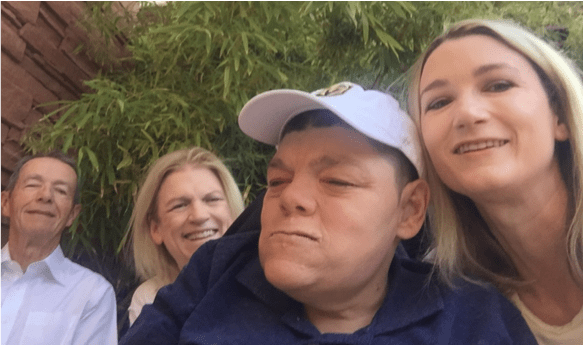By Taryn Hojlo
Kate Martin and her family were exasperated. Her older brother, Michael, desperately needed professional care to help manage his health and daily needs. But there were few providers in Las Vegas who accepted Michael’s insurance, and even fewer who seemed capable of treating him with the same dignity and respect that other patients received without a second thought.
After a lifelong struggle with epilepsy, Michael had considerable physical and intellectual impairments. Although his condition made him eligible for Medicaid, finding local services that would accept it proved to be a struggle. Those that did often neglected to treat Michael as an individual and failed to involve him in the management of his own care. There were times when Michael wasn’t even addressed during his own appointments.
“He struggled pretty significantly with access to care and getting what he needed,” says Martin, a family physician who will be graduating from UMass Boston Gerontology’s Management of Aging Service masters program later this month.
“As he grew older, he faced increasing obstacles. Things that shouldn’t be obstacles seemed to be things that got in the way for him,” she says.
As a doctor and associate dean for Graduate Medical Education at the University of Nevada, Las Vegas, Martin frequently dealt with vulnerable patients at the county hospital where she worked. She recognized that the social disparities her brother faced in the healthcare system were significant, and she advocated for his independence whenever possible.
Martin recently described what it was like growing up with her brother and how those experiences impacted her career in an opinion article featured in JAMA Neurology. She noted that Michael’s case, although personal, was not unique.
“These disparities in health, differences in health outcomes based solely on being a member of a socially disadvantaged group, are injustices,” she wrote. “During this era of tremendous creativity and innovation everywhere around us, I have no doubt that we will devise new solutions and become a more inclusive society in the process.”
Martin also noticed that there were striking similarities between her brother’s experiences and those encountered by her grandmother years earlier while she was a dementia resident in a care facility. She realized that older adults and those with disabilities faced many of the same obstacles when seeking care and became interested in learning more about care management.
“I thought, ‘What can I learn about on the system-level? How can I make things better?’”
After researching different graduate schools, Martin decided to enroll in the UMass Boston MAS program. She was especially excited about the Capstone project, which she saw as the perfect opportunity to share her personal experiences in a meaningful way.
After years of advocating for both her brother and grandmother, she felt that a more proactive approach was needed to change how health services are delivered to vulnerable and marginalized populations. She decided to use her Capstone research project to create and teach her own undergraduate course.
“I thought by teaching a course to people who might be future doctors or engineers, to get them thinking about people who are not often thought about when creating a solution, that maybe I could introduce some empathy to the whole process,” says Martin.
“I want to teach [my students] how to empathize with people they may not know, to try to understand,” she says. “There’s a better way to treat people. We can do so much more than this.”
The course, now called “Healthcare Redesign,” will teach students how to apply human-centered design thinking to social issues in the healthcare system. It will be offered to University of Nevada honors college students for the Fall 2020 semester.
Michael passed away suddenly last year following a brief illness. He was 49 years old.
As Martin finishes her last remaining MAS courses before graduating, she hopes to preserve Michael’s memory by continuing her work with vulnerable patients, and by teaching others how to address the healthcare disparities they so often face.
“Pursuing a career that focuses on gerontology helps me take the time to specialize my work in honor of these family members,” she says. “While my grandmother and brother are no longer alive, they remain with me every day in the work I do to help others like them.”


Leave a Reply